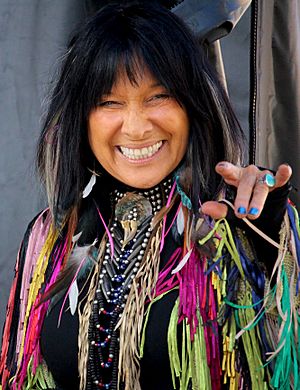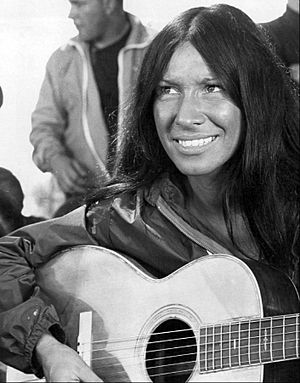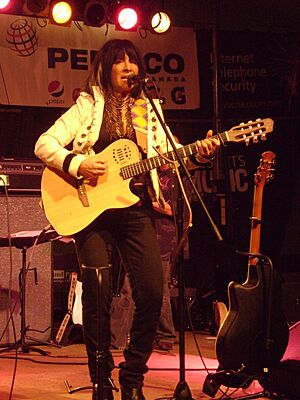Buffy Sainte-Marie facts for kids
Quick facts for kids
Buffy Sainte-Marie
|
|
|---|---|

Sainte-Marie in 2015
|
|
| Background information | |
| Birth name | Beverley Jean Santamaria |
| Born | February 20, 1941 Stoneham, Massachusetts, U.S. |
| Died | Error: Need valid death date (first date): year, month, day |
| Genres | |
| Occupation(s) |
|
| Instruments |
|
| Years active | 1963–2023 (touring) |
| Labels | |
| Associated acts | Pete Seeger, Leonard Cohen, Patrick Sky |
Buffy Sainte-Marie (born Beverley Jean Santamaria on February 20, 1941) is an American singer, songwriter, and activist. She is known for her folk and rock music. Her songs often talk about love, war, and important issues for Indigenous peoples in the United States and Canada.
Buffy Sainte-Marie has received many awards for her music, education work, and social activism. In 1983, her song "Up Where We Belong" won an Academy Award for Best Original Song. It also won a Golden Globe Award for Best Original Song.
For many years, Sainte-Marie said she had Indigenous Canadian family. However, a 2023 investigation by CBC News found that she was born in the United States. It showed she has Italian and English family. Because of this, some Indigenous musicians and groups asked for her awards to be taken back. In 2025, many of her awards and honors were removed. These included her membership in the Order of Canada and her induction into the Canadian Music Hall of Fame.
| Top - 0-9 A B C D E F G H I J K L M N O P Q R S T U V W X Y Z |
Early Life and Learning
Buffy Sainte-Marie was born in Stoneham, Massachusetts, in the U.S. Her parents were Albert and Winifred Santamaria. Her father's parents were from Italy, and her mother's family was English. After the Second World War, her family changed their last name from Santamaria to "Sainte-Marie." They did this because some people had negative feelings towards Italians at the time.
Buffy taught herself to play piano and guitar when she was a child and a teenager. In the 1950s, she went to the University of Massachusetts Amherst. She earned degrees in teaching and Asian philosophy. She has said she was one of the top students in her class.
Music Career and Activism
Starting Out: 1960s and 1970s
In her early twenties, Buffy Sainte-Marie traveled alone. She performed in concert halls and folk music festivals. She also visited First Nations communities in the U.S., Canada, and other countries. She spent time in coffeehouses in Toronto and New York City. She was part of the folk music scene with artists like Leonard Cohen and Joni Mitchell.
In 1963, Buffy faced a health challenge that inspired her song "Cod'ine." Many artists later recorded this song. Also in 1963, she saw soldiers returning from the Vietnam War. This led her to write her famous anti-war song "Universal Soldier." She released it on her first album, It's My Way!, in 1964. This song became a hit for other singers too.
Her 1965 album Many a Mile included "Until It's Time for You to Go." This became her most successful song. Many famous artists, like Elvis Presley and Barbra Streisand, have recorded it.
Some of her songs talked about how Native Americans were treated unfairly. These included "Now That the Buffalo's Gone" (1964) and "My Country 'Tis of Thy People You're Dying" (1966). These songs caused some discussion at the time.
Other well-known songs by Sainte-Marie include "Mister Can't You See" (a top hit in 1972). She appeared on TV shows like Rainbow Quest with Pete Seeger and Sesame Street. In 1970, she recorded Illuminations. This album used a special electronic music tool called a Buchla synthesizer.
Buffy on Sesame Street
In 1975, Sesame Street hired Buffy Sainte-Marie to teach children about Native American cultures. She wanted to show young viewers that "Indians still exist." She was on Sesame Street regularly from 1976 to 1981. In a 1977 episode, she breastfed her son, Dakota "Cody" Starblanket Wolfchild. She believes this was the first time breastfeeding was shown on television.
Sesame Street even filmed some shows at her home in Hawaii in 1978.
Later Work: 1980s to 2023
Buffy Sainte-Marie started using computers in 1981 to record her music and create art. The song "Up Where We Belong" was co-written by Sainte-Marie. It was sung by Joe Cocker and Jennifer Warnes for the movie An Officer and a Gentleman. This song won an Academy Award for Best Original Song in 1982. It also won a Golden Globe Award for Best Original Song in 1983.
In 1989, she wrote music for Where the Spirit Lives. This film was about Native children being taken to residential schools. In 1992, after not recording for 16 years, Sainte-Marie released Coincidence and Likely Stories. She recorded this album at home in Hawaii using her computer. It included songs like "Bury My Heart at Wounded Knee," which talked about the struggles of Native Americans.
In 1996, she started the Nihewan Foundation. This group helps Native American students with their education. The word nihewan means "talk Cree" in the Cree language. It encourages people to connect with their culture. She also created the Cradleboard Teaching Project. This project connects Native American students with non-Native students to learn about different subjects.
In 2002, a song by Sainte-Marie called "Lazarus" was used by hip hop producer Kanye West. In 2008, she released her album Running for the Drum. In 2015, she released Power in the Blood. This album won the 2015 Polaris Music Prize.
In 2017, she released "You Got to Run (Spirit of the Wind)." This song was inspired by George Attla, a champion dog sled racer. In 2022, a documentary film about her life, Buffy Sainte-Marie: Carry It On, was released. On August 3, 2023, Sainte-Marie announced she was stopping live performances due to health reasons.
Personal Life
In 1964, Buffy Sainte-Marie visited the Piapot Cree reserve in Saskatchewan, Canada. She was adopted by Emile Piapot and Clara Starblanket Piapot. This was done following traditional Cree Nation customs.
Sainte-Marie has supported the Bahá'í faith, but she does not belong to any specific religion. She believes in a universal spiritual faith.
She applied for Canadian citizenship in 1980. However, in 2017, she stated that she is a US citizen and does not have a Canadian passport.
Buffy Sainte-Marie has been married three times. Her last marriage was to Jack Nitzsche, who co-wrote "Up Where We Belong" with her. She has one son, Dakota "Cody" Starblanket Wolfchild.
Claims About Her Background
Buffy Sainte-Marie has often said she was born on the Piapot 75 reserve in Saskatchewan, Canada. She also claimed she was taken from her Cree parents as a baby. This was part of a government policy called the Sixties Scoop.
However, her uncle and brother tried to say in the 1960s and 1970s that she was not Indigenous. Her brother, Alan Sainte-Marie, said she was not born on a reserve and had white parents. He received a letter from a law firm representing Buffy Sainte-Marie. The letter warned him about speaking about her family background.
On October 27, 2023, an investigation by CBC's The Fifth Estate showed that Sainte-Marie's claims about her Indigenous background were not true. The investigation included interviews with her relatives. It also found her birth certificate. This document listed her as white and named Albert and Winifred Santamaria as her birth parents.
The day before the CBC broadcast, the Piapot and Starblanket families released a statement. They defended Sainte-Marie's connection to the Piapot First Nation. They said: "We claim her as a member of our family." They added that this family connection was more important than any official papers.
Buffy Sainte-Marie's son, Cody, has said she gained a Native identity through "naturalization," not by birth. Her younger sister took a DNA test. It showed she had almost no Native American ancestry. She also said she is genetically related to Sainte-Marie's son. This would not be possible if Sainte-Marie was adopted as she claimed.
In November 2023, Buffy Sainte-Marie removed claims about being Cree and born on Piapot First Nation from her website. The acting chief of the Piapot First Nation, Ira Lavallee, said that Sainte-Marie was still accepted by the community. He noted that one of their families had adopted her. He also suggested she take a DNA test to clear up the confusion.
In late November 2023, Sainte-Marie said, "My mother told me that I was adopted and that I was Native, but there was no documentation as was common for Indigenous children at the time." She added, "I don't know where I'm from or who my birth parents are, and I will never know."
Awards and Honors
Buffy Sainte-Marie has received many honorary degrees from universities. These are special degrees given to honor someone's achievements.
Honorary Degrees
| University | Title | Year Awarded |
|---|---|---|
| University of Regina | Honorary Doctor of Laws | 1996 |
| Lakehead University | Honorary Doctor of Letters | 2000 |
| University of Saskatchewan | Honorary Doctor of Humanities | 2003 |
| Emily Carr Institute of Art and Design | Honorary Doctor of Letters | 2007 |
| Carleton University | Honorary Doctor of Laws | 2008 |
| University of Western Ontario | Honorary Doctor of Music | 2009 |
| Ontario College of Art and Design | Honorary Doctor of Fine Arts | 2010 |
| Brandon University | Honorary Doctor of Music | 2010 |
| Wilfrid Laurier University | Honorary Doctor of Letters | 2010 |
| University of British Columbia | Honorary Doctor of Letters | 2012 |
| Vancouver Island University | Honorary Doctor of Laws | 2016 |
| University of Lethbridge | Honorary Doctor of Laws | 2017 |
| Dalhousie University | Honorary Doctor of Laws | 2018 |
| University of Toronto | Honorary Doctor of Laws | 2019 |
Personal Awards
| Award | Year Awarded | Status | Note |
|---|---|---|---|
| Queen Elizabeth II Golden Jubilee Medal | 2002 | Revoked 2025 | |
| Queen Elizabeth II Diamond Jubilee Medal | 2012 | Revoked 2025 | |
| Juno Humanitarian Award | 2017 | Revoked 2025 | Awarded as Allan Waters Humanitarian Award |
| Companion of the Order of Canada | 2019 | Terminated 2025 | Promotion from Officer in 1997 |
| PARO Inaugural Women Voice Award | 2019 | ||
| Canadian Music Week Allan Slaight Humanitarian Spirit Award |
2020 | ||
| TIFF Jeff Skoll Award in Impact Media | 2022 |
Performance Awards
| Award | Year Awarded | Status | Note |
|---|---|---|---|
| Academy Award for Best Original Song for "Up Where We Belong" | 1983 | Joint winner with Jack Nitzsche and Will Jennings |
|
| Canadian Music Hall of Fame Inductee | 1995 | Revoked 2025 | |
| Canadian Aboriginal Music Awards Lifetime Achievement Award |
2008 | Awards now known as Indigenous Music Awards |
|
| Governor General's Performing Arts Award | 2010 | Revoked 2025 | |
| Polaris Music Prize | 2015 | Revoked 2025 | for Power in the Blood |
| Juno Award for Indigenous Music Album of the Year | 2018 | Revoked 2025 | for Medicine Songs |
| Indigenous Music Awards for Best Folk Album | 2018 | for Medicine Songs | |
| Canadian Songwriters Hall of Fame Inductee | 2019 | ||
| Polaris Heritage Prize for It's My Way! | 2020 | Revoked 2025 |
Other Recognitions
- In 1979, Buffy Sainte-Marie was featured on a Supersisters trading card.
- Canada Post released a stamp of Sainte-Marie in 2021.
Awards and Identity Controversy
After the 2023 investigation by The Fifth Estate about Buffy Sainte-Marie's identity claims, many people called for her awards to be taken back. These awards were meant for Indigenous artists. Indigenous musicians who had lost to Sainte-Marie expressed their sadness. For example, the sister of singer Kelly Fraser wondered if winning the 2018 Juno Award instead of Sainte-Marie might have changed Kelly's life.
The Indigenous Women's Collective asked the Juno Awards to look again at the 2018 category. They wanted to "right a past wrong." Tim Johnson, a former director at the National Museum of the American Indian, said her Juno awards should be taken away. He felt that Indigenous musicians who lost to her should be seen as her victims. Rhonda Head, an opera singer, said, "She won awards that were an accolade, that were meant for Indigenous musicians and that's what really hurts me the most."
On February 7, 2025, the Government of Canada announced that Sainte-Marie had been removed from the Order of Canada. This decision was made by Governor General Mary Simon on January 3, 2025. In March 2025, her Governor General's Performing Arts Award, Polaris Music Prizes, Juno Awards, and Canadian Music Hall of Fame induction were also taken back. This was because she was no longer considered to meet the requirements, as she was not a Canadian citizen.
Images for kids
See also
 In Spanish: Buffy Sainte-Marie para niños
In Spanish: Buffy Sainte-Marie para niños
 | Shirley Ann Jackson |
 | Garett Morgan |
 | J. Ernest Wilkins Jr. |
 | Elijah McCoy |






